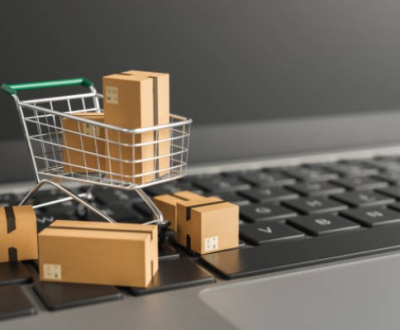The Future of E-Commerce: Trends to Watch
- October 19, 2024
- Business on Line

The Future of E-Commerce: Trends to Watch
E-commerce has been on the rise for the past decade, with more and more consumers turning to online shopping for their retail needs. The growth of e-commerce has been driven by factors such as the convenience of home delivery, the wide selection of products available online, and the ability to shop from anywhere at any time. As technology continues to advance, the future of e-commerce looks brighter than ever before. In this article, we will explore some of the key trends that are shaping the future of e-commerce and discuss what we can expect to see in the coming years.
1. Artificial Intelligence and Machine Learning
Artificial intelligence (AI) and machine learning are revolutionizing the way e-commerce companies operate. These technologies are being used to analyze customer data, personalize recommendations, and automate tasks such as customer service and inventory management. One of the biggest ways that AI is impacting e-commerce is through chatbots. These virtual assistants can help customers find products, answer questions, and even process orders. In the future, we can expect to see AI and machine learning become even more integrated into e-commerce platforms, providing a more personalized and efficient shopping experience for consumers.
2. Augmented Reality and Virtual Reality
Augmented reality (AR) and virtual reality (VR) are two technologies that are transforming the way consumers shop online. AR allows customers to see products in a real-world setting before making a purchase, while VR creates immersive shopping experiences that can make customers feel like they are in a physical store. These technologies are especially beneficial for industries such as furniture and cosmetics, where customers typically prefer to see products in person before buying. As AR and VR become more accessible and affordable, we can expect to see a surge in e-commerce companies using these technologies to enhance the shopping experience for their customers.
3. Voice Commerce
With the rise of virtual assistants such as Amazon's Alexa and Google Assistant, voice commerce is becoming increasingly popular. Customers can now use their voice to search for products, add items to their cart, and make purchases online. This hands-free shopping experience is convenient for consumers and can lead to increased sales for e-commerce companies. As voice recognition technology improves, we can expect to see more e-commerce platforms integrating voice commerce capabilities into their websites and mobile apps.
4. Mobile Shopping
Mobile shopping is already a major trend in e-commerce, with a growing number of consumers using their smartphones and tablets to make purchases online. In fact, mobile commerce is expected to account for over 70% of all e-commerce transactions by 2022. To cater to this trend, e-commerce companies are optimizing their websites and apps for mobile devices, ensuring that the shopping experience is seamless and user-friendly. In the future, we can expect to see more companies investing in mobile-first strategies to attract and retain mobile shoppers.
5. Sustainability and Ethical Shopping
Consumers are becoming increasingly conscious of the environmental and social impact of their purchasing decisions. As a result, there is a growing demand for sustainable and ethically sourced products. E-commerce companies are responding to this trend by offering eco-friendly products, promoting fair trade practices, and supporting charitable causes. In the future, we can expect to see more e-commerce companies prioritizing sustainability and ethical shopping, and consumers will have more options to shop in a way that aligns with their values.
6. Subscription Services
Subscription services are another trend that is gaining popularity in the e-commerce industry. From beauty boxes to meal kits, subscription services offer customers a convenient way to receive products on a recurring basis. These services not only provide a steady stream of revenue for companies but also foster customer loyalty and engagement. As subscription services become more customizable and personalized, we can expect to see them become a staple in the e-commerce landscape.
7. Same-Day and Next-Day Delivery
As consumer expectations for fast shipping continue to rise, e-commerce companies are investing in logistics and fulfillment strategies to offer same-day and next-day delivery options. These quick delivery options provide a competitive edge for online retailers, as customers are more likely to make a purchase if they know they can receive their order quickly. In the future, we can expect to see more e-commerce companies offering expedited shipping services and partnering with delivery providers to meet the demand for fast and efficient shipping.
8. Social Commerce
Social media platforms such as Instagram, Facebook, and Pinterest are becoming key players in the e-commerce industry. These platforms are integrating shopping features that allow users to discover and purchase products directly from their feeds. Social commerce is especially popular among younger consumers who are active on social media and value recommendations from influencers and peers. In the future, we can expect to see social commerce become more prominent, with e-commerce companies leveraging social media to drive sales and engage with customers.
9. Personalization and Customization
Personalization and customization are shaping the future of e-commerce, as consumers seek unique and tailored shopping experiences. E-commerce companies are using data analytics and AI to personalize product recommendations, promotions, and marketing messages for individual customers. By offering personalized recommendations and customization options, companies can increase customer satisfaction and loyalty. In the future, we can expect to see more e-commerce companies investing in personalization and customization to create a more engaging and relevant shopping experience for their customers.
10. Blockchain Technology
Blockchain technology is another trend that is gaining traction in the e-commerce industry. This decentralized and secure technology is being used to improve supply chain transparency, prevent fraud, and streamline transactions. By using blockchain, e-commerce companies can ensure the authenticity and provenance of products, protect customer data, and facilitate peer-to-peer transactions. As blockchain technology continues to evolve, we can expect to see more e-commerce companies adopting blockchain solutions to enhance security and efficiency in online transactions.
In conclusion, the future of e-commerce is bright and full of opportunities for innovation and growth. By staying abreast of these trends and embracing new technologies, e-commerce companies can stay ahead of the competition and provide a superior shopping experience for their customers. As consumers continue to embrace online shopping as a way of life, e-commerce companies must adapt and evolve to meet their changing needs and preferences. The future of e-commerce is dynamic and ever-changing, and companies that are able to stay agile and innovative will thrive in this rapidly evolving industry.
FAQs
1. What are the benefits of e-commerce for consumers?
E-commerce offers a wide range of benefits for consumers, including convenience, a wide selection of products, competitive prices, and the ability to shop from anywhere at any time. With e-commerce, consumers can compare prices, read reviews, and make purchases without leaving the comfort of their homes.
2. How can e-commerce companies improve the shopping experience for customers?
E-commerce companies can improve the shopping experience for customers by personalizing recommendations, offering fast and reliable shipping options, providing excellent customer service, and implementing user-friendly website and app designs. By listening to customer feedback and staying ahead of trends, companies can create a seamless and enjoyable shopping experience for their customers.
3. What are some challenges facing e-commerce companies in the future?
Some challenges facing e-commerce companies in the future include increasing competition, cybersecurity threats, and changing consumer preferences. Companies must stay ahead of the curve by investing in technology, staying up-to-date with industry trends, and adapting quickly to market changes to remain competitive in the ever-evolving e-commerce landscape.
4. How can e-commerce companies use data analytics to improve their business?
Data analytics can help e-commerce companies gain insights into customer behavior, preferences, and trends, enabling them to make informed decisions and improve their business operations. By analyzing data, companies can personalize recommendations, optimize pricing strategies, improve marketing campaigns, and enhance the overall shopping experience for customers.
5. What role will mobile shopping play in the future of e-commerce?
Mobile shopping is expected to play a significant role in the future of e-commerce, as more consumers use their smartphones and tablets to make purchases online. E-commerce companies must optimize their websites and apps for mobile devices to cater to this trend and provide a seamless and user-friendly shopping experience for mobile shoppers.
In conclusion, the future of e-commerce looks promising, with new technologies and trends shaping the industry and providing opportunities for growth and innovation. By staying ahead of these trends and providing a superior shopping experience for customers, e-commerce companies can thrive in this dynamic and ever-evolving landscape.












